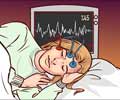A new study has found that bipolar disorder is highly influenced by the circadian system, the body’s internal clock, and a specific kind of psychotherapy might help decrease irregularities
A new study has found that bipolar disorder is highly influenced by the circadian system, the body’s internal clock, and a specific kind of psychotherapy might help decrease irregularities in the circadian system, which can trigger key symptoms of bipolar disorder.
The study, led by Ellen Frank, Ph.D., clinical psychologist and professor of psychiatry and psychology at the University of Pittsburgh School of Medicine, found that people with bipolar disorder tend to have extremely sensitive circadian systems, which makes it much more difficult for them to recover from disruptions in sleep and routine.In contrast, people without bipolar disorder generally recover fairly quickly if their systems are thrown off by a change in routine or loss of sleep and might even be temporarily energized by these alterations.
“Having already found that disruption in daily routines can make individuals with bipolar disorder vulnerable to new episodes of illness, we have now learned that working with patients to achieve and maintain regular social rhythms – including regular sleep patterns and adequate physical activity – will help to protect them against episodes of mania or depression,” said Frank.
In the study, 175 adult patients with bipolar disorder were studied.
The researcher then compared the effects of two approaches when combined with a common medical treatment for bipolar disorder, usually lithium carbonate: the first was interpersonal and social rhythm therapy, in which patients use a self-monitoring instrument to record and monitor the regularity of their daily routines, for example, their sleep patterns, meal times and physical activity.
The second approach involved an intensive clinical management paradigm focusing just on patients’ mood symptoms and management of medication side effects.
Advertisement
Frank contemplated that many study participants had other medical and psychiatric conditions that also had important effects on their treatment outcomes.
Advertisement
The finding is important because it shows that psychotherapy which focuses on practical lifestyle changes can ease the symptoms of bipolar disorder.
The study was presented at the American College of Neuropsychopharmacology (ACNP) annual meeting.
Source-ANI
LIN/P











